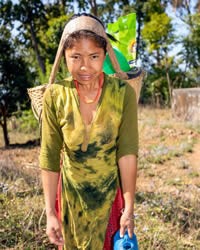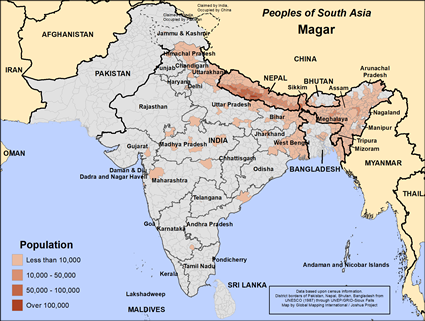The Magar are one of the oldest known tribes in Nepal; however, their origin is unclear. They are believed to be of Tibetan descent because their language and dances are similar to those within the Tibetan culture. Some of the Magar live in the plains where the Himalayan hills begin. Others occupy the lower hills of the Mahabharat Lekh while a few inhabit the high altitude mountain areas.
There are two major groups of Magar (the Eastern and Western) and which are further divided into at least eight clans. The Magar language, which is divided into four groups, gives the people a distinct tribal identity. This linguistic classification is important in understanding the Magar tribes.
Most Magar are craftsmen, although some who own their land have become farmers. Others work as miners, blacksmiths or basket weavers. They tend to be hard-working, honest, self-reliant and self-sufficient people. They are very jovial and love to sing and dance. They have several kinds of dances as well as tribal games that they frequently play.
The Eastern Magar typically live in large, two-story stone houses with slate or thatch roofs. The homes are often constructed with large porches in front.
The Eastern Magar have a unique style of dress. They often adorn themselves with fulis (flower-like ear ornaments) in the middle parts of their ears and necklaces made of glass beads and silver Indian coins. Some aspects of western style clothing are slowly becoming more common.
Magar marriages are arranged in a unique fashion. The groom's brother-in-law must go to the bride's family and offer a "bride price" of money and alcohol. If the proposal is accepted, further payments are then made. Marriages to maternal first cousins are the most common arrangements.
The most distinctive element in the Magar family kinship is the strong bond between maternal uncles and their nephews. They treat each other with mutual respect because when the nephew is ready to marry, his bride will be chosen from among his uncle's daughters.
"Life cycle rituals" are a very important part of Magar society. They hold a special birth ceremony eleven days after a child is born. The baby is named and then washed for the first time. One festival known as Jyestha Poornima is observed in May or June at the time of the full moon. During the ceremony, they offer freshly harvested grains to the gods.
The Magar ancestors were shamanists, but today they are officially Hindu. Their form of Hinduism incorporates aspects of Tibetan Buddhism. Hinduism and Buddhism are both flexible religions. The Magar worship the Hindu goddess, Kalika as well as their ancestors. They retain their ancient shamanistic practices along with forms of ancestor worship.
Intercession is the key to breaking down the spiritual strongholds over the Magar people and seeing them reached with the light of Christ. There are already some Magar Christ followers in Nepal, and they can reach many others.
Pray for Magar Christ followers to take his glory to other Magar people, both in Nepal and beyond.
Pray for the Magar peoples to have the spiritual hunger it takes to embrace Christ no matter what the social cost may be.
Pray that the Lord of the harvest will thrust forth laborers into Nepal.
Ask God to give the few Eastern Magar believers opportunities to share the gospel with their own people.
Ask the Lord to raise up a strong multiplying church among the Eastern Magar.
Scripture Prayers for the Magar in Nepal.
https://en.wikipedia.org/wiki/Magars
| Profile Source: Joshua Project |













